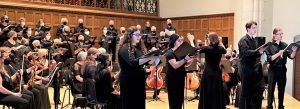This summer, I worked with Professor Christine Howlett to study community engagement through choral practice. For the first half of this research program, I helped run BachFest, a choral and orchestral festival with community singers. This included helping to organize rehearsals and materials, as well as having an administrative role in the festival’s planning and execution. I also got to participate in the choir. In addition, I wrote researched program notes about the background and history of the pieces that were performed.

A snapshot from the BachFest performance on June 26, 2022. Photo courtesy of Kevin T McEneany and The Millbrook Examiner.
After BachFest, I had the pleasure of interviewing members of Cappella Festiva, a community choir which Professor Howlett directs, as well as members of community choirs in my hometown of Fairfax, Virginia. These interviews were conducted via Zoom and then transcribed. Though the participants came from various backgrounds and had a variety of musical appreciation, education, and experience, all of the interviewees noted the profound impact that choral singing (and music in general) has had on their well-being, with many also pointing to its positive social effects.
In tandem with these two projects, I read many scientific studies pertaining to the effects of choral singing on mental health, well-being, and community engagement. These studies echoed what we found in our interviews, namely the power of singing as a stress relief, an escape, a social vehicle, and a labor of love. As a singer myself, I can corroborate these points from personal experience, but seeing the positive effect of community singing in real, concrete terms, from observation, research, and hearing others’ personal experiences, reminded me of its importance.
Professor Howlett and I have decided to continue this project into the 2022-2023 academic year, during which we will conduct more interviews and more research in other fields to find a holistic picture of the power of community singing on well-being.
